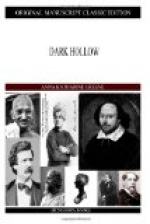And thus the lawyer found them when he returned from closing the gate behind Flannagan.
XXVI
THE TELEGRAM
“I cannot say anything, I cannot do anything till I have had a few words with Mrs. Scoville. How soon do you think I can speak to her?”
“Not very soon. Her daughter says she is quite worn out. Would it not be better to give her a rest for to-night, judge?”
The judge, now quite recovered, but strangely shrunk and wan, showed no surprise, at this request, odd as it was, on the lips of this honest but somewhat crabbed lawyer, but answered out of the fulness of his own heart and from the depths of his preoccupation:
“My necessity is greater than hers. The change I saw in her is inexplicable. One moment she was all fire and determination, satisfied of Oliver’s innocence and eager to proclaim it. The next—but you were with us. You witnessed her hesitation—felt its force and what its effect was upon the damnable scamp who has our honour—the honour of the Ostranders under his tongue. Something must have produced this change. What? good friend, what?”
“I don’t know any more than you do, judge. But I think you are mistaken about the previous nature of her feelings. I noticed that she was not at peace with herself when she came into the room.”
“What’s that?” The tone was short, and for the first time irritable.
“The change, if there was a change, was not so sudden as you think. She looked troubled, and as I thought, irresolute when she came into the room.”
“You don’t know her; you don’t know what passed between us. She was all right then, but—Go to her, Black. She must have recovered by this time. Ask her to come here for a minute. I won’t detain her. I will wait for her warning knock right here.”
Alanson Black was a harsh man, but he had a soft streak in him—a streak which had been much developed of late. Where he loved, he could be extraordinarily kind, and he loved, had loved for years, in his own way which was not a very demonstrative one, this man whom he was now striving to serve. But a counter affection was making difficulties for him just at this minute. Against all probability, many would have said possibility, Deborah Scoville had roused in this hard nature, a feeling which he was not yet ready to name even to himself, but which nevertheless stood very decidedly in his way when the judge made this demand which meant further distress to her.
But the judge had declared his necessity to be greater than hers, and after Mr. Black had subjected him to one of his most searching looks he decided that this was so, and quietly departed upon his errand. The judge left alone, sat, a brooding figure in his great chair, with no light in heart or mind to combat the shadows of approaching night settling heavier and heavier upon the room and upon himself with every slow passing and intolerable minute.




